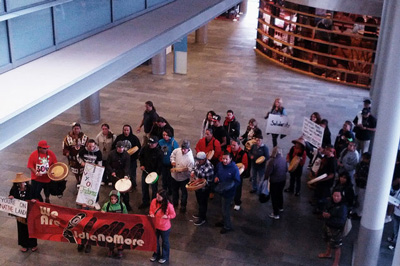
Honest, paywall-free news is rare. Please support our boldly independent journalism with a donation of any size.
Christopher Columbus was the ISIS of his day.
He justified rape, murder and pillage with religion and funded his efforts with whatever he could steal.
Today, while millions across America are celebrating Columbus Day, the city of Seattle is celebrating Indigenous Peoples’ Day.
That’s because last week, the Seattle city council unanimously passed a resolution to honor the contributions and cultures of Native Americans on the second Monday of October.
While Seattle’s decision may seem unusual, it’s actually part of growing trend.
Many cities and states across the country have shifted away from celebrating Columbus Day, and that’s because more and more Americans are learning the real history behind Christopher Columbus and his “discovery.”
First of all, Columbus didn’t actually discover the Americas, despite what you may have been taught in elementary school.
Thanks to archaeological evidence, we know now that there were many other groups who traveled to the Americas long before Columbus did.
For example, back in the 10th century, the Vikings had settlements in what are now Greenland and Newfoundland.
And DNA evidence proves that Polynesians came to South America almost a century before Columbus sailed the ocean blue.
So, Columbus’ “discovery” of the Americas wasn’t really a discovery at all.
But enough about the discovery. Let’s talk about the man himself, and what he did to the indigenous peoples that he found when he arrived in the New World.
When Columbus set sail in 1492, he was on the hunt for gold to bring back to Europe, and eventually landed on an island known as Hispaniola, which today is the home of the Dominican Republic and Haiti.
Unfortunately, Columbus didn’t discover much gold on Hispaniola, but he did find something as good as it, if not better: people.
And Columbus thought that the indigenous people that he discovered would make great slaves.
When Columbus discovered the Taino indigenous peoples of Hispaniola, he wrote back to the Spanish monarchs funding his voyage, saying that,
“They are well-built, with good bodies and handsome features…They do not bear arms, and do not know them, for I showed them a sword, they took it by the edge and cut themselves out of ignorance. They have no iron. Their spears are made of cane…They would make fine servants…With fifty men we could subjugate them all and make them do whatever we want. Here there are so many of these slaves…although they are living things they are as good as gold…”
Over time, Columbus’ real actions in the Americas have been replaced by a warm-and-fuzzy coloring book story of a bold and brave explorer who set out to discover a new world.
But in reality, as we have learned from writings of Christopher Columbus’ own men, the “bold explorer” raped, pillaged, enslaved and slaughtered people just to get rich.
One of Columbus’ crewmen, Miguel Cuneo, wrote about the scene when Columbus arrived in Hispaniola for the second time, and thousands of Tainos, or what were referred to as Indians, came out to greet Columbus’ ships.
Cuneo wrote,
“When our caravels…were to leave for Spain, we gathered…one thousand six hundred male and female persons of those Indians…For those who remained, we let it be known [to the Spaniards] in the vicinity that anyone who wanted to take some of them could do so, to the amount desired, which was done.”
Cuneo also wrote that he took his own sex slave, a beautiful young girl, who in his own words, “resisted with all her strength,” leaving him with no choice but to, “thrash her mercilessly and rape her.”
Columbus eventually started up a global child-sex-slave trade, shipping off Indians to all corners of the globe.
He even bragged about it to a friend in a letter written in 1500, saying that, “A hundred castellanoes (a Spanish coin) are as easily obtained for a woman as for a farm, and it is very general and there are plenty of dealers who go about looking for girls; those from nine to ten (years old) are now in demand.”
Under Columbus’ rule, life for the Taino people became so bad that they resorted to mass suicide.
Twenty-five years after Columbus had arrived in Hispaniola, the Spanish missionary Pedro Cordoba wrote that,
“As a result of the suffering and hard labor they endured, the Indians choose and have chosen suicide. Occasionally a hundred have committed mass suicide. The women, exhausted by labor, have shunned conception and childbirth. Many, when pregnant, have taken something to abort and have aborted. Others after delivery have killed their children with their own hands, so as not to leave them in such oppressive slavery.”
Eventually, Columbus resorted to wiping out the Taino altogether.
Prior to Columbus’ arrival in the New World, scholars place the population of Haiti/Hispaniola at around 1.5 to 3 million people.
By 1496, it was down to 1.1 million, according to a census done by Bartholomew Columbus, Columbus’ brother.
By 1516, the indigenous population was at 12,000, and by 1542, fewer than 200 natives were alive on Hispaniola.
By 1555, every single native was dead. Every last one.
If Columbus was robbing, raping and pillaging Hispaniola today, we would probably be bombing him from the air
It’s time to put the shameful history of Columbus and his enslavement and murder of Native Americans behind us – and start celebrating the indigenous peoples who called the Americas home long before Columbus ever set sail.
Press freedom is under attack
As Trump cracks down on political speech, independent media is increasingly necessary.
Truthout produces reporting you won’t see in the mainstream: journalism from the frontlines of global conflict, interviews with grassroots movement leaders, high-quality legal analysis and more.
Our work is possible thanks to reader support. Help Truthout catalyze change and social justice — make a tax-deductible monthly or one-time donation today.